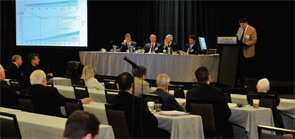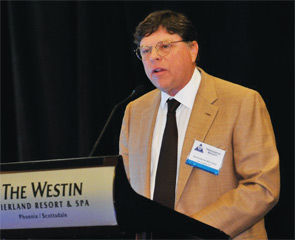SCOTTSDALE—The debate over soaring health care costs fails to properly acknowledge the benefits that have stemmed from improved medical technology and expanded medical knowledge, said Triological Society President Gerald Berke, MD, in an address at the society’s Combined Sections Meeting, held here on Jan. 27.
In otolaryngology, an area in which technological advances have figured so prominently, those benefits have been particularly striking, Dr. Berke said. “The most important factors contributing to the growth of spending for health care in recent decades have been the emergence, adoption and widespread diffusion of new medical technologies and services,” said Dr. Berke, chief of head and neck surgery at the University of California, Los Angeles. “Many of these innovations rely on costly new drugs, equipment and skills that have allowed us to diagnose and treat illnesses that were previously impossible. Although technological advances sometimes reduce costs, in medicine such advances and the resulting changes in clinical practice have generally increased spending.”
Rising Costs
Dr. Berke, who said the hardest thing about being the society’s president was trying to decide what to give his speech about, said that he was inspired by a dream he had recently in which he imagined a health care economics expert making an appearance at grand rounds in 1986. The expert, in the dream, warned that medical care consumed 12 percent of the national budget and that something dire would happen if that number didn’t come down.
Today, health care consumes 17 percent of the gross domestic product.
“I’m sure that same expert, if he were still alive, would be saying, ‘You can’t go any higher because something really bad is going to happen unless we make drastic changes,’” Dr. Berke said.
Over the last several years, the rate of increase in health spending has been the lowest in five decades, but the percentage of the gross domesstic product (GDP) going to health care has gone up because of an overall contraction of the GDP.
Apples and Oranges
His dreamed-about health care expert also went on about the neonatal death rate in the U.S. being as bad as a developing country and the overall quality of health care being 37th in the world.
Dr. Berke said comparisons like these ignore differences in how statistics are compiled from country to country. “Direct comparisons between countries may be misleading,” he said. In the U.S., he explained, all births, regardless of how far along the pregnancy is, are included in those numbers, while in other countries, only full-term births are included.
Dr. Berke said other claims are also misleading, including the National Research Council’s observation that the longevity of U.S. residents is lower than that of residents of other wealthy nations, due to smoking. When the data are adjusted for motor vehicle accidents and homicides, the U.S. “just about leads the world in longevity,” he said. He added that this is especially striking given the obesity epidemic in the U.S.
“Statistics like these are also skewed by the fact that we are a very large, diverse country, with very diverse cultural and economic demographics, so that broad generalizations are often not that informative,” Dr. Berke said.
Similarly, the Organisation of Economic Co-operation and Development has found that the survival rates are best in the U.S. for 13 of the 16 most common malignancies, as well as for myocardial infarctions.
“We don’t often hear about these laudatory comments in our health care, but these facts are obviously appreciated by persons from many other countries who come here to receive their care for serious illnesses,” he said.

New Technology
Although they’ve increased costs, technological advances have obviously been beneficial. Sinus surgery, he noted, used to be done by open procedures and “mostly by feel with little visualization” before the arrival of miniaturized scopes and cameras.
Improvements in care can be easily imagined, he said, even though they might involve increased costs.
“If one projects our present understanding of the neurovascular microanatomy, anti-rejection medication, therapies for malignancies and understanding of the genome,” he said, “I can dream of a time in the near future—let’s say 25 years—when patients with advanced disease states of the larynx, tongue and pharynx could have the organs removed, kept viable in vitro by extracorporeal perfusion, repaired or treated by high-dose chemotherapy or radiation without systemic side effects and then microvascularly reimplanted in the body and selectively reinnervated. Possibly even a new organ could be grown in culture to replace the diseased one.”
The Congressional Budget Office believes that certain more costly technologies and services will have to be limited in favor of cheaper services, even though outcomes research has shown that those services are often inferior, Dr. Berke said.
The progress made in medicine is coming back to haunt the industry, he said. “In some respects, we are being unfairly blamed and are paying the price today, and will pay even more tomorrow, for having been so successful in increasing longevity and maintaining quality of life,” Dr. Berke said.
The idea of forcing cuts that might compromise innovations that could otherwise help patients was an emotional point for Dr. Berke. He talked about the time 20 years ago when he was referred a Latino tree trimmer who had fallen and crushed his larynx and trachea. Dr. Berke operated on him several times pro bono.
“When I finally removed his T tube,” he said, “I distinctly remember on his last visit, when I taped up his tracheostomy, he looked up at me with tears of gratitude in his eyes and I heard him speak for the first time. He said, ‘Thank you, Dr. Berke, thank you.’”
—Paul Levine, MD
Dr. Berke said he realized at that moment that medicine is a privileged profession and that, despite today’s climate of uncertainty, helping patients is the real motivation behind why doctors do what they do.
Audience Response
The address was well received by the crowd.
“His remarks were right on target,” said Paul Levine, MD, chair of otolaryngology-head and neck surgery at the University of Virginia in Charlottesville. “I think that he’s, number one, making us remember the importance of what we do, and recognizing that making a lot of money isn’t all of what we do.”
Some of the criticism of health care spending has been brought on by doctors themselves, though, Dr. Levine said.
“We as an organization, i.e., physicians, have spent the last 10 or more years just trying to get reimbursements from Medicare and fighting with insurance companies, and clearly that’s been the wrong approach,” he said. “If we had stressed quality, we would have gotten what we would consider reasonable payment for our work.”
David Schuller, MD, cancer research chair at the Ohio State University College of Medicine in Columbus, said he was glad Dr. Berke challenged the assertions made about medicine in the U.S.
“It was great to see that Gerry has delved into the details to try to sort out some of these criticisms of American health care, and is it apples to apples?” Dr. Schuller said.
“I loved the way he ended it, quite frankly, talking about (how) the value of our discipline is the opportunity to develop special relationships with our patients,” he said, adding that a doctor without such a relationship would be more inclined to order costly tests to cover himself and avoid litigation. “Having these relationships that evolve over time,” he said, “is really key, I think, to practicing effective medicine.”

Leave a Reply